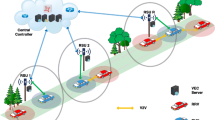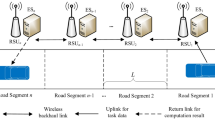Abstract
With recent advances in sensing technologies and the emerging intelligent transportation system applications, smart vehicles impose huge requirements on processing computation-intensive tasks with strict time constraints, which cannot be satisfied solely relying on local computation resources. Vehicular edge computing is an efficient paradigm for enabling low-latency and high-quality service. In this paper, we consider a multi-period task offloading scenario in vehicular edge computing environment, where tasks can be offloaded in any period during their lifetime. Then, we formulate the multi-period offloading problem (MOP) to maximize the task completion ratio, by analyzing the mobility-aware communication model, resources-aware computation model and deadline-aware award model. Further, considering the high mobility of vehicles and dynamic wireless environments, we propose a real-time distributed strategy (RtDS) to solve MOP by exploiting the collaboration among edge nodes and client vehicles. Finally, we build the simulation model based on real vehicular trajectories and give a comprehensive performance evaluation, which demonstrates the superior performance of RtDS.











Similar content being viewed by others
Explore related subjects
Discover the latest articles and news from researchers in related subjects, suggested using machine learning.References
Morgan YL (2010) Notes on dsrc & wave standards suite: its architecture, design, and characteristics. IEEE Commun Surv Tutorials 12(4):504–518
Chen S, Hu J, Shi Y, Zhao L (2016) Lte-v: a td-lte-based v2x solution for future vehicular network. IEEE Intern Things J 3(6):997–1005
Chen S, Hu J, Shi Y, Zhao L, Li W (2020) A vision of c-v2x: technologies, field testing, and challenges with chinese development. IEEE Intern Things J 7(5):3872–3881
Liu K, Feng L, Dai P, Lee VC, Son SH, Cao J (2017) Coding-assisted broadcast scheduling via memetic computing in sdn-based vehicular networks. IEEE Trans Intell Transp Syst 19(8):2420–2431
Liu K, Ng JKY, Wang J, Lee VC, Wu W, Son SH (2015) Network-coding-assisted data dissemination via cooperative vehicle-to-vehicle/-infrastructure communications. IEEE Trans Intell Transp Syst 17(6):1509–1520
Liu K, Xiao K, Dai P, Lee V, Guo S, Cao J (2020) Fog computing empowered data dissemination in software defined heterogeneous vanets. IEEE Transac Mobile Comp 1. https://doi.org/10.1109/TMC.2020.2997460
Li Z, Dai Y, Chen G, Liu Y (2016) Content distribution for mobile Internet: A cloud-based approach. Springer, NewYork
Sabella D, Moustafa H, Kuure P, Kekki S, Zhou Z, Li A, Thein C, Fischer E, Vukovic I, Cardillo J et al (2017) Toward fully connected vehicles: edge computing for advanced automotive communications. 5G Automot. Assoc.(5GAA), White Paper
Liu K, Xu X, Chen M, Liu B, Wu L, Lee VC (2019) A hierarchical architecture for the future internet of vehicles. IEEE Commun Mag 57(7):41–47
Qiu H, Ahmad F, Govindan R, Gruteser M, Bai F, Kar G. (2017), Augmented vehicular reality: Enabling extended vision for future vehicles. In: Proceedings of the 18th International Workshop on Mobile Computing Systems and Applications, pp. 67–72
Xu X, Liu K, Xiao K, Feng L, Wu Z, Guo S (2020) Vehicular fog computing enabled real-time collision warning via trajectory calibration. Mob Netw Appl 25(6):2482–2494
Feng J, Liu Z, Wu C, Ji Y (2018) Mobile edge computing for the internet of vehicles: offloading framework and job scheduling. IEEE Veh Technol Mag 14(1):28–36
Wang K, Yin H, Quan W, Min G (2018) Enabling collaborative edge computing for software defined vehicular networks. IEEE Netw 32(5):112–117
Ning Z, Wang X, Huang J (2019) Mobile edge computing-enabled 5g vehicular networks: toward the integration of communication and computing. IEEE Veh Technol Mag 14(1):54–61
Zhu C, Tao J, Pastor G, Xiao Y, Ji Y, Zhou Q, Li Y, Ylä-Jääski A (2018) Folo: latency and quality optimized task allocation in vehicular fog computing. IEEE Internet Things J 6(3):4150–4161
Choo S, Kim J, Pack S. (2018) , Optimal task offloading and resource allocation in software-defined vehicular edge computing. In: 2018 International Conference on Information and Communication Technology Convergence (ICTC), pp. 251–256. IEEE
Liu Y, Wang S, Zhao Q, Du S, Zhou A, Ma X, Yang F (2020) Dependency-aware task scheduling in vehicular edge computing. IEEE Internet Things J 7(6):4961–4971
Ning Z, Dong P, Wang X, Rodrigues JJPC, Xia F (2019) Deep reinforcement learning for vehicular edge computing: an intelligent offloading system. ACM Trans. Intell. Syst. Technol
Zhang K, Zhu Y, Leng S, He Y, Maharjan S, Zhang Y (2019) Deep learning empowered task offloading for mobile edge computing in urban informatics. IEEE Internet Things J 6(5):7635–7647
Liu C, Liu K, Guo S, Xie R, Lee VCS, Son SH (2020) Adaptive offloading for time-critical tasks in heterogeneous internet of vehicles. IEEE Internet Things J 7(9):7999–8011
Gu B, Zhou Z (2019) Task offloading in vehicular mobile edge computing: a matching-theoretic framework. IEEE Veh Technol Mag 14(3):100–106
Huang X, Yu R, Xie S, Zhang Y (2020) Task-container matching game for computation offloading in vehicular edge computing and networks. IEEE Transac Intel Transp Syst. https://doi.org/10.1109/TITS.2020.2990462
Wang Y, Lang P, Tian D, Zhou J, Duan X, Cao Y, Zhao D (2020) A game-based computation offloading method in vehicular multiaccess edge computing networks. IEEE Internet Things J 7(6):4987–4996
Hui Y, Su Z, Luan T, Li C, Mao G, Wu W (2020) A game theoretic scheme for collaborative vehicular task offloading in 5g hetnets. IEEE Transac Veh Technol. https://doi.org/10.1109/TVT.2020.3041587
Peng H, Shen X (2021) Multi-agent reinforcement learning based resource management in mec- and uav-assisted vehicular networks. IEEE J Sel Areas Commun 39(1):131–141
Wang J, Liu K, Li B, Liu T, Li R, Han Z (2020) Delay-sensitive multi-period computation offloading with reliability guarantees in fog networks. IEEE Trans Mob Comput 19(9):2062–2075
Wyner A (1974) Recent results in the shannon theory. IEEE Trans Inf Theory 20(1):2–10
Sadek AK, Han Z, Liu KR (2009) Distributed relay-assignment protocols for coverage expansion in cooperative wireless networks. IEEE Trans Mob Comput 9(4):505–515
Martello S, Toth P (1980) Solution of the zero-one multiple knapsack problem. Eur J Oper Res 4(4):276–283
Chekuri C, Khanna S (2005) A polynomial time approximation scheme for the multiple knapsack problem. SIAM J Comput 35(3):713–728
Liu Y, Yu H, Xie S, Zhang Y (2019) Deep reinforcement learning for offloading and resource allocation in vehicle edge computing and networks. IEEE Trans Veh Technol 68(11):11158–11168
Wang C, Liang C, Yu FR, Chen Q, Tang L (2017) Computation offloading and resource allocation in wireless cellular networks with mobile edge computing. IEEE Trans Wireless Commun 16(8):4924–4938
Acknowledgements
This work was supported in part by the National Natural Science Foundation of China under Grant No.61872049, No.61802263 and No.62072064.
Author information
Authors and Affiliations
Corresponding author
Ethics declarations
Conflicts of interest
The authors declare that they have no conflict of interest.
Additional information
Publisher's Note
Springer Nature remains neutral with regard to jurisdictional claims in published maps and institutional affiliations.
Rights and permissions
About this article
Cite this article
Liu, C., Liu, K., Ren, H. et al. RtDS: real-time distributed strategy for multi-period task offloading in vehicular edge computing environment. Neural Comput & Applic 35, 12373–12387 (2023). https://doi.org/10.1007/s00521-021-05766-5
Received:
Accepted:
Published:
Issue Date:
DOI: https://doi.org/10.1007/s00521-021-05766-5




